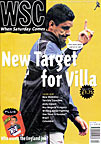 Zimbabwe's failed love affair with the African Nations Cup has opened the doors for others. Alan Duncan finds out what went wrong
Zimbabwe's failed love affair with the African Nations Cup has opened the doors for others. Alan Duncan finds out what went wrong
On March 14th, the Executive Committee of the Confederation of African Football (CAF) meet to decide whether Zimbabwe will be allowed to stage the African Cup of Nations in 2000. Their decision may have a major impact on the direction of world football politics for years to come.
The first signs that the tournament would be taken away from its delegated hosts had been in the aftermath of the FIFA presidential elections in June 1998. The applause that greeted Sepp Blatter as he was confirmed as the new FIFA president must have reverberated in the ears of the CAF president Issa Hayatou long after the voting members had returned to their seats. But if Hayatou had felt let down or even “betrayed”, which was the soundbite adopted by his supporters, it is only that he had contrived to invite disaster upon himself. During the CAF congress in February of that year, he had promised Blatter’s rival candidate Lennart Johansson the African votes en bloc through a directive issued to all the member countries. And so it was a bitter looking Hayatou who raced through the Meridien Montparnasse hotel in Paris amid small gatherings of jocular African federation chiefs.
The mood was set, and there were bound to be repercussions. By July the CAF inner circle had sat down behind closed doors and decided to bring its full weight to bear on the alleged recalcitrant members. The irony, of course, being that no one really knew who had voted for whom.
However, in keeping with the anglophone-francophone schism within CAF, it was generally assumed that the loyalties of east and southern Africa, to which Zimbabwe of course belongs, had lain firmly with the Blatter camp, while the francophone west and central African group had toed the official CAF line. In this light, the inspection of Zimbabwe’s facilities in August 1998 was never going to make for a happy post-World Cup reunion, especially after CAF had let it be known that the hosts would only be allowed to keep ten per cent of the revenue generated from the tournament and not the usual 20 per cent. The inspection itself was a qualified success, with three of the four venues in reasonable shape, but the other still up in the air.
Another visit followed in December, which all but gave Zimbabwe the all clear, provided that work started without any further delay at Mutare – the newly designated fourth venue – and that the Local Organising Committee (LOC) secured the necessary financial guarantees from their government. The LOC, however, insisted that they could underwrite building costs through private sponsorship.
At a meeting with the CAF executive in Ivory Coast on February 8th, the Zimbabwean delegation were offered only a perfunctory hearing, without even being able to call on the services of a French interpreter in the francophone-dominated forum. By the end of that day, CAF had revoked Zimbabwe’s hosting rights and swiftly invited bidders. CAF, very much in the mould of Hayatou’s own homeland, Cameroon, while officially preaching a policy of parity between anglophones and francophones, offers a quite different reality. While Zimbabwe’s approach to hosting Africa’s biggest sporting event could have been more responsible, the fact remains that their predicament was no worse than, say, that of francophone Burkina Faso in the build-up to the 1998 edition.
Next year’s CAF congress stands to be a turning point for Hayatou, who will be fighting for his political life. Samir Zaher, president of the Egyptian Football Federation, has already stepped forward as a candidate for his job. The African press now more openly debates the question of succession, once a taboo subject. An air of embarrassment hung over the VIP box in the Ivorian capital Abidjan during the Super Cup final between local team ASEC Mimosas and Esperance of Tunisia when the latest editions of the locally-based magazine Stades d’Abidjan ran the cover headline: Who Wants Hayatou’s Seat?
Morocco, Nigeria, and Ghana have put their names forward as alternative hosts, but all seem reluctant to become a part of a wider political game. South Africa, to their credit, have promised to help Zimbabwe get the show on the road, and if it is handed back to them by March 14th, when the Executive Committee meets, CAF may yet even be able to claim the credit for making it possible. The crisis surrounding the Nations Cup has served, provisionally at least, to increase the bargaining power of Hayatou. But his personal campaign to stay in office may be as long drawn-out as the construction of the stadium at Mutare.
From WSC 146 April 1999. What was happening this month